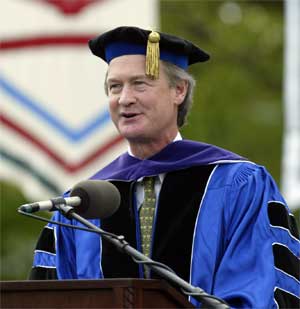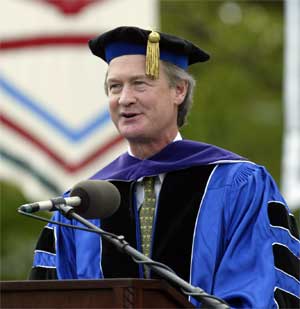 Speech by
Speech bySenator Lincoln Chafee
University of Rhode Island Commencement
Kingston, Rhode Island
May 20, 2007
Good afternoon. It is an honor indeed to address the University of Rhode Island’s Class of 2007 on this very important day in your life.
We call this ceremony a commencement, because it is that, a beginning. Today we celebrate your graduation from the University of Rhode Island, and also the anticipation of the exciting time that comes after your college years. In addition to a rigorous schedule of classes, tests and papers, many of you have done extracurricular activities such as sports, music and art. Many of you have also worked to help pay the bills. What you have accomplished hasn’t been easy. This has to be a very happy day for you.
I’m sure some of you have great plans, a job or an internship that you’ll report to at 9 am tomorrow. Maybe you even have your whole life mapped out.
For many others, those words, “What next?” might cause a burst of perspiration.
From my own experience, I can say that the Pulitzer-prize-winning novelist James Michener’s words, “Go waste, young man,” was the advice I heard and heeded.
This was a play on the line made famous by Horace Greeley, the influential New York Tribune editor.
He wrote, “Go West, young man!”, during the 1850s. His was a call to the ambitious, to shape the future of the country by taking part in the expansion into western territories. His intent was to harness the energy and optimism of a generation.
But what did Mr. Michener mean with his interesting paraphrase, “Go waste, young man”? Certainly he wasn’t advocating holing up as an unproductive, antisocial recluse. No, his was a call to young people to give themselves some space to have experiences that might not immediately relate to a career path, but that nonetheless be important in building a strong personal foundation.
That is what Mr. Michener, also a self-made man, had done: before settling down as a teacher and acclaimed novelist, he traveled across the country by box car and held an array of odd jobs, including working at a carnival. He later explained himself thus: “I think young people ought to seek that experience that is going to knock them off center.”
After my commencement a few years ago, I did go West – to Bozeman, Montana, where I learned to shoe horses, and then to the race tracks in Alberta, Canada. I spent seven very eventful years working there, and hardly a day goes by that I don’t recall these years with fondness. And trust me, it wasn’t always easy! I can remember trainers being justifiably angry when my work wasn’t as good as it should have been, and I can remember coming out of a restaurant on June 1 in Calgary – and it was snowing! But the good far outweighed the bad. And the confidence I gained from those years has served me well ever since.
“West” is a state of mind, that I urge you all to find in the coming months, before you accumulate too much in the way of real responsibility – career, family, mortgage, credit card bills.
This advice has always been good, but it is particularly important for your generation, which has come to be known as the “Millennials”. 75 million strong, your group is being heralded by the media and social scientists as perhaps the most important to come along since the young people who came of age during World War II.
Unprecedented time and treasure are being expended to study and survey you. Last month at a conference in Los Angeles on marketing to Millennials, whole panels at the conference were devoted to how advertisers might reach you through the diffuse portals of IM, email, social networks, chat rooms, IPods, cell phones, P2P networks and handheld devices, to get you to buy whatever it is they’re selling.
After all this time and effort putting you under the microscope, just what is it that we think we know about you so far?
According to one survey, Millennials tend to hold progressive views, but the lion’s share of you – 40 percent – identifies with neither the Democrats nor the Republicans.
You are the most diverse generation in our nation’s history – forty percent are nonwhite. And having been raised with “diversity” and “multiculturalism” as watchwords, you have lived the message: a Gallup poll conducted in 2005 found that 60 percent of 18-to-29-year-olds had actually dated someone of a different race.
Millennials care deeply about their fellow citizens. A 2005 survey of 260,000 college freshman found that a full two-thirds of them believe it is “essential to very important” to help others – the largest percentage in a generation.
Another amazing characteristic: you have great relationships with your predominately Baby Boomer parents, the very generation that coined the term “generation gap.” Recent research found that 80 percent of 18-to-25-year-olds had talked to their parents in the past day! This is not exactly poetic justice, given how much grief my rebel generation gave our parents.
Now that I am working full-time on a college campus, and have the privilege to spend my days with students your age, I share in a profound sense of optimism about the future. My personal observation is that the graduates we are sending out into the world are neither cynical nor confrontational, but rather tolerant, concerned, curious and engaged. Whether you have a path comfortably laid out before you or you choose to figuratively “go waste,” my impressions are shared by the author of the book Parenting the Millennial Generation. Dave Verlangen wrote that you will “rise to the occasion and show courage, character, determination, innovation and vision in ways that really make the world a better place.”
I would like to leave you with one more thought before you take your first step off this campus, with degree in hand.
The playwright Noel Coward said, “It is discouraging how many people are shocked by honesty and how few by deceit.” And I agree.
So let me make this a call for candor in all your dealings with the world, especially as you grow in experience and assume positions of public trust. Deserve that trust. Shock people with your honesty.
I urge you to emulate Abraham Lincoln, who said, “I am a firm believer in the people. If given the truth, they can be depended upon to meet any national crises. The great point is to bring them the real facts.” And I further urge you to demand the real facts from those in positions of authority. EXPECT honesty at every turn.
Embrace adventure, and always tell and expect the truth. Watch out, world: here comes the Class of 2007!
Thank you.
URI photo by Joe Giblin

